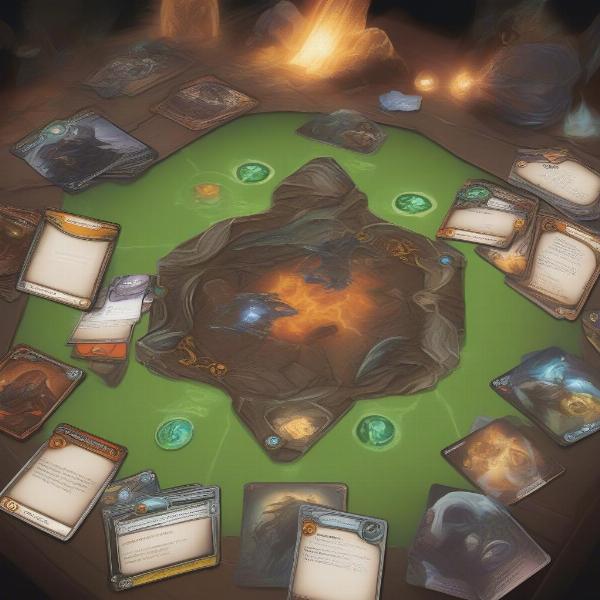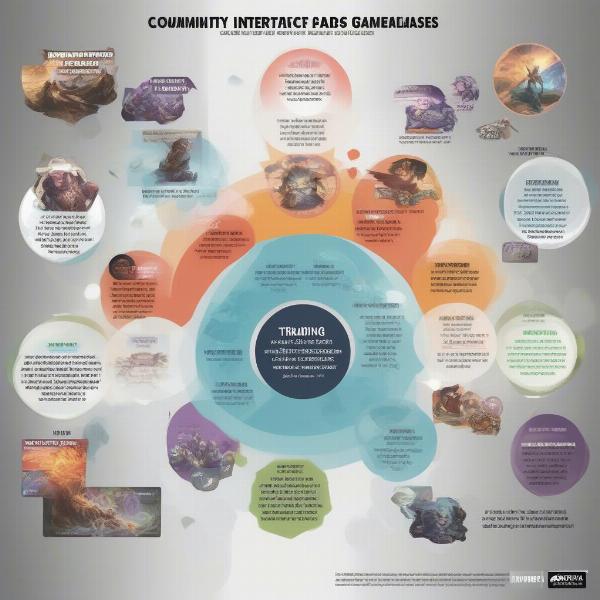Trading card games (TCGs) are captivating, strategic games played with specially designed cards. Each card represents a character, creature, item, or spell with unique abilities and stats. Players build customized decks and battle against each other, strategically deploying their cards to achieve victory. The allure of TCGs lies in the blend of collecting, deck building, and tactical gameplay, creating a dynamic and engaging experience.
Do you enjoy collecting, strategizing, and battling? Then the world of trading card games might be perfect for you! This article delves deep into what constitutes a trading card game, exploring its key components, popular examples, and the reasons behind its enduring popularity. We’ll cover everything from basic gameplay mechanics to the thrill of collecting rare cards.
Understanding the Core Mechanics of TCGs
At its heart, a trading card game is a two-player game where each player uses a deck of cards they’ve assembled. These decks are composed of various card types, each serving a different function. Think of it like building an army, where each card represents a different unit or piece of equipment. Common card types include creatures, spells, artifacts, and lands, each with their own set of rules and abilities.
A crucial aspect of TCGs is the element of resource management. Players must carefully manage their resources, often represented by specific card types, to play more powerful cards and execute complex strategies. This adds a layer of strategic depth, as players must balance their offensive and defensive capabilities while anticipating their opponent’s moves. The interplay of these mechanics creates a dynamic environment where every decision matters.
The victory conditions in TCGs vary depending on the specific game. Some games require players to reduce their opponent’s life points to zero, while others involve achieving specific objectives or fulfilling certain conditions. This variety keeps the gameplay fresh and allows for diverse strategic approaches.
 Trading Card Game Core Mechanics Illustration
Trading Card Game Core Mechanics Illustration
Exploring Popular Trading Card Games
The world of TCGs boasts a rich and diverse landscape, with numerous games capturing the hearts of players worldwide. Some of the most popular and influential TCGs include Magic: The Gathering, Pokémon, and Yu-Gi-Oh!. Each game offers a unique universe, lore, and gameplay mechanics, catering to a wide range of player preferences.
Magic: The Gathering, often considered the grandfather of modern TCGs, is known for its complex gameplay and vast card pool. Pokémon, with its charming creatures and accessible mechanics, has captured a massive following among younger players. Yu-Gi-Oh!, with its emphasis on fast-paced duels and powerful monster cards, offers a different flavor of strategic gameplay. These are just a few examples of the many successful TCGs out there.
The enduring popularity of these games can be attributed to several factors, including their engaging gameplay, the thrill of collecting, and the sense of community they foster. Many players enjoy the social aspect of TCGs, trading cards, participating in tournaments, and connecting with other enthusiasts. This social element adds another layer of enjoyment and contributes to the long-lasting appeal of these games.
Why are Trading Card Games so Popular?
The enduring appeal of TCGs goes beyond simply playing a game; it’s about immersing oneself in a rich world of strategy, collection, and community. The constant influx of new cards and expansions keeps the gameplay fresh and exciting, offering players endless possibilities for deck building and strategic experimentation.
Beyond the gameplay itself, the collecting aspect of TCGs is a major draw for many players. The pursuit of rare and valuable cards can be a thrilling experience, and the act of building a comprehensive collection can be just as rewarding as winning a match. This combination of gameplay and collecting creates a compelling loop that keeps players engaged for years.
 Factors Contributing to the Popularity of Trading Card Games
Factors Contributing to the Popularity of Trading Card Games
Is there a Pokemon board game?
You might be wondering about the overlap between trading card games and board games. While both offer strategic gameplay and often involve collecting, they are distinct categories. However, some franchises, like Pokémon, have ventured into both realms. To learn more about the existence of a Pokémon board game, check out our dedicated article: is there a pokemon board game. This article explores the different types of Pokémon board games and how they differ from the trading card game.
Building Your First TCG Deck
Getting started with a TCG can be daunting, but with a little guidance, you’ll be building your own powerful decks in no time. The first step is choosing a game that resonates with you. Consider the game’s theme, art style, and complexity to find one that suits your preferences.
Once you’ve selected a game, familiarize yourself with the basic rules and mechanics. Most TCGs offer starter decks that are designed to teach new players the ropes. These decks provide a solid foundation and can be a great starting point for building your own customized deck.
As you gain experience, you can start experimenting with different card combinations and strategies. Don’t be afraid to try new things and develop your own unique playstyle. The beauty of TCGs lies in their endless possibilities for deck building and strategic innovation.
The Future of Trading Card Games
The world of TCGs continues to evolve, embracing new technologies and expanding its reach to new audiences. Online platforms and digital versions of popular TCGs are becoming increasingly prevalent, offering players new ways to connect and compete. This digital evolution opens up exciting possibilities for the future of TCGs, allowing for greater accessibility and innovative gameplay features.
The combination of physical and digital experiences is likely to shape the future of TCGs, offering players a seamless blend of traditional and modern gameplay. As technology continues to advance, we can expect even more exciting developments in the world of trading card games.
Conclusion
Trading card games offer a unique blend of strategy, collecting, and community, making them a captivating hobby for players of all ages. From the thrill of opening booster packs to the intense competition of a tournament match, TCGs provide a dynamic and engaging experience. So, whether you’re a seasoned veteran or a curious newcomer, the world of trading card games has something to offer everyone. Dive in and discover the magic for yourself!
FAQ
- What is the difference between a TCG and a CCG? The terms “Trading Card Game” (TCG) and “Collectible Card Game” (CCG) are often used interchangeably. They both refer to the same type of game.
- How do I get started with a trading card game? Most TCGs offer starter decks designed for new players. These decks are a great way to learn the rules and begin building your collection.
- Are trading card games expensive? The cost of playing a TCG can vary greatly. While some players build budget-friendly decks, others invest significant amounts in acquiring rare and valuable cards.
- Where can I play trading card games? You can play TCGs with friends, at local game stores, or online through various digital platforms.
- What makes trading card games so popular? The combination of strategic gameplay, the thrill of collecting, and the sense of community are key factors contributing to the popularity of TCGs.
- Are there digital versions of trading card games? Yes, many popular TCGs have digital counterparts, allowing players to experience the game online.
- How often are new cards released for TCGs? Most TCGs release new sets of cards regularly, typically several times a year, to keep the gameplay fresh and exciting.

